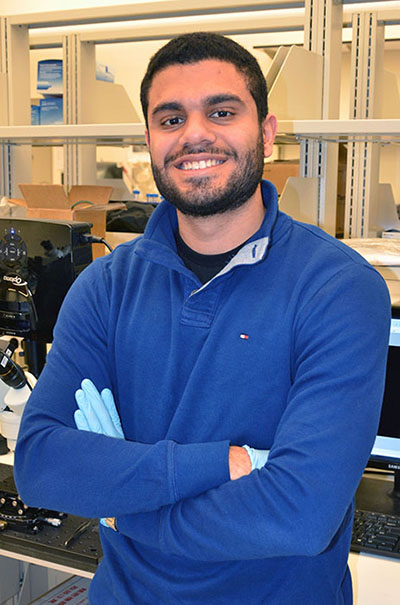Leslie Bottorff Fellow Ángel Enríquez Mujica
Leslie Bottorff Fellow Ángel Enríquez Mujica
How does an undergraduate program in mechanical engineering, traditionally aimed to employ students in industrial settings, launch an individual's imagination toward solving mysteries at the cellular level and crossing boundaries to improve medical treatments and the future of one's homeland? Ángel Enríquez Mujica found the answer to that question when he discovered the broad possibilities at Purdue's Weldon School of Biomedical Engineering and through the Engineering-Medicine Partnership with Indiana University School of Medicine.
After excelling in studies at the University of Puerto Rico Mayagüez campus and proactively pursuing biomedical research with UPRM's mechanical engineering faculty, Ángel visited Indiana with his bachelor's degree to seek alternatives to a standard biotech-industry career track. He was invited to be part of Purdue's Midwest Crossroads Alliance for Graduate Education and the Professoriate (AGEP) Bridge program, and he joined the pioneering Laboratory of Implantable Microsystems Research (LIMR) where implantable micro systems fabricated actuate when exposed to magnetic fields are in development to help patients by probing the mechanics of cells.

This research and the teamwork opportunities within the Engineering-Medicine Partnership led to Ángel's enrollment as a PhD candidate. "I just knew this was the path to take," he says. With his collaborators, he learned that tiny devices can be activated remotely to stretch cells like those which enter the lungs when breast cancer has metastasized. He helped create a system that mimics the microenvironment of these cells so the mechanical strains they undergo can be observed and their behavior can be understood.
"Right now, I'm working on fabricating these micro devices" in clean-room settings, collaborating with Purdue-based co-mentors Luis Solorio and Hugh Lee, both assistant professors of biomedical engineering, and IU School of Medicine-based co-mentor Albert Lee, a professor of neurosurgery. Various aspects of the technology still need more study, such as better actuators for the devices and better emulation of the environments in which the cells operate. "We can get better data," says Ángel about his engineering team.
Devices perfectly placed inside the body for extended periods could perform healing functions such as drug delivery and treatment of hydrocephalus (also called water on the brain), which is often fatal. Clinicians may complement their neurosurgical knowhow to remove obstructions using microfabricated actuators that respond to alternating magnetic fields. The development work involves collaborators from the Purdue's Weldon School of Biomedical Engineering and College of Veterinary Medicine as well as IU School of Medicine.
The promise of the technology has attracted a range of supporters. The project receives funding from the National Institutes of Health. Besides remuneration for his lab work through Bridge, Ángel has received a commitment of financial support through Purdue from the national GEM Consortium, which increases participation by members of underrepresented groups. His innovative contributions to medical practice also earned him an Innovation for Clinical Translation (ICT) Fellowship.
His interest in eventually becoming a professor of biomedical engineering is tied in with yet another boundary he wants to cross.
"One of my goals is to go back and contribute to Puerto Rico in some way," Ángel says. He would like to join an engineering faculty there "to establish better connections for students for graduate school. His alma mater's customary guidance for its graduates means most of them take positions in industry outside Puerto Rico and don't contribute directly to the local economy. "I definitely feel the urge to help the island" recover from its economic crisis and the aftermath of natural disasters. He wants to help educate talented young people there as "independent thinkers who are motivated to enter graduate school or grow a business."